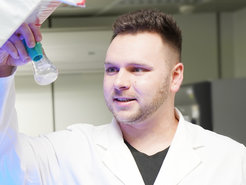Dr. Florian Lindner receives the MarBiNa Prize
The Max Planck junior scientist is awarded for his work on controlling a bacterial injection apparatus
Some bacteria use tiny injection apparatuses to transfer proteins into other cells. In his doctoral thesis, Dr. Florian Lindner from the Max Planck Institute for Terrestrial Microbiology found a way to control the bacterial apparatus using light. The technique offers new approaches for basic research, but also for future medical applications. For this achievement, he received the Marburg Biotechnology and Nanotechnology Promotion Award 2022 from the Initiative for Bio- and Nanotechnology e.V. (IBiNa) on March 21, 2023.

The research group "Bacterial Secretion Systems" at the Max Planck Institute for Terrestrial Microbiology led by Dr. Andreas Diepold investigates the structure and function of bacterial injection apparatuses. Located in the outer membrane of the bacterial cell, they are used by the bacterium to inject proteins into other cells, for example toxic substances into intestinal cells. Researchers have been working for several years on utilising such bacterial apparatuses to deliberately introduce proteins, for example therapeutics, into human cells. But how can the system be controlled to target the desired cells?
Dr Florian Lindner has found a solution during his doctorate. He made use of the relatively novel technique known as optogenetics: a protein that reacts to light stimuli is coupled with an element of the apparatus. The light stimuli change the protein's structure with the result that the apparatus stops functioning. This process is reversible, like a power switch that temporarily interrupts an electric circuit.
For his achievement, Florian Lindner won the Marburg Biotechnology and Nanotechnology Promotion Award 2022, which was presented by Lord Mayor Dr Thomas Spies in Marburg Town Hall. With this award, the Initiative for Bio- and Nanotechnology e.V. (IBiNa) promotes young scientists in the field of biotechnology and nanotechnology and honours them for their outstanding work.
The innovative challenge of his work was particularly appealing , according to Dr. Florian Lindner: " There was this idea at the beginning, but it was still unclear whether it would work. I am therefore particularly pleased to receive this award."
The target of the optogenetic switch is an essential component that is not bound to the outer shell of the bacterium. Moving freely inside the cell and being constantly replaced, it allows the bacterium to quickly control the injection process in its natural environment, the human digestive system. By responding to the acidity of the gastric millieu, the bacteria only release their valuable cargo in the alkaline small intestine, as Andreas Diepold's research group uncovered in previous studies.
"With our technique, we briefly pull the protein out of the process while we can continue to study the functioning of the apparatus. This is very helpful, especially when dealing with dynamic processes," says Florian Lindner.
The researchers were surprised to see how well the method worked. "By keeping the protein away from the injection system in a light-controlled manner, we were able to switch off the function of the whole apparatus. We didn't expect that." But getting there was difficult. "We tried many optogenetic switches that didn't work. The breakthrough came by chance. We realised that the ratio between two parts of the optogenetic switch has to be right," Lindner explains.
The method also opens up new paths for future applications in medicine, for example cancer research, as research group leader Andreas Diepold emphasises: "Our vision is to use the injection apparatus, which bacteria normally use to introduce harmful proteins into host cells, as a "therapeutic delivery tool" through optogenetic coupling. This would allow targeted delivery of therapeutics into cells, for example cancer cells."
Max Planck Innovation has already patented the technology. What might emerge from it in the future is still unclear. In two collaborations with oncology labs at the Philipps University of Marburg, the research team has investigated how the cargo must be biochemically constituted in order for it to enter the cancer cell. The team even succeeded in introducing apoptosis-inducing proteins, i.e. a substance that induces the death of the cancer cell, into a cancer cell line in a light-controlled manner which caused the cells to die.
Florian Lindner hopes that other researchers will be able to exploit the results further. "For future studies, the viability of the system must be proven in the mouse model. Developing this is not easy and takes time. Here I do hope for future collaborations that will continue this work."












